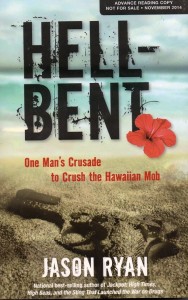Book Review: Hell-Bent by Jason Ryan
Disclaimer: I received this book as a Goodreads giveaway on the premise that I would review it. My copy was an advanced reading copy, and changes will be made in the published version, due out November 2014. In particular, the end notes and index were not yet finished.
Hawaii’s reputation as a tropical paradise vacation destination tends to gloss over the fact that it’s inhabited by fallible human beings, who have the same problems there as anywhere else. In particular, during the 1970s, it had a skyrocketing crime rate, with far too many unsolved murders. But this wasn’t the exotic crime you’d see on Hawaii Five-O, but mundane crime like drugs, prostitution and gambling. And not clever locked room mysteries but thuggish mob hits.
This book centers its narrative on the murder of Charles “Chuckers” F. Marsland III, a nightclub bouncer, and its effect on his father Charles F. Marsland, Jr. Mr. Marsland, an attorney, was galvanized into desiring the eradication of organized crime from Hawaii, and eventually became the Chief Prosecutor of Honolulu.
The history of Hawaii is briefly sketched from the first time it was contacted by outsiders, through the loss of its sovereignty, and becoming a state. Thereafter, it concentrates on the matter of organized crime, why it became such a big issue, and who the major players were alleged to be.
While many of them were convicted of crimes, one of the people mentioned most in the book has never even been indicted, much to the frustration of Marsland and others who believed him to be the “godfather” of Hawaiian crime. The fact that he’s never been proved a criminal is repeatedly brought up, often after a direct quote from someone accusing him of crimes.
Mr. Marsland was apparently, like many driven people, a difficult person, often accusing people who did not completely follow his program of being soft on crime, or actively corrupt. While he made great strides at bringing down the crime rate, he eventually lost re-election to a more reasonable-sounding prosecutor.
Hawaiian politics play some role in the book, as does the entertainment world. Many of the criminals had gone to school with people who’d made good, so odd-seeming friendships were not uncommon.
There will be a photo section, bibliography, end notes and an index when the book is fully published. There’s also an essay by the author on his sources, who he could and could not get information from.
The writing is okay but not gripping. I’d recommend this book to true crime readers, and people with an interest in Hawaii beyond the tourist destinations.


Interesting. I never even knew that they had a mob. Sounds like a real eye-opener.
It was mostly home-grown; the locals were very rough on haole mobsters who tried to muscle in. (Oahu being a relatively small place, strangers stuck out like a sore thumb.)